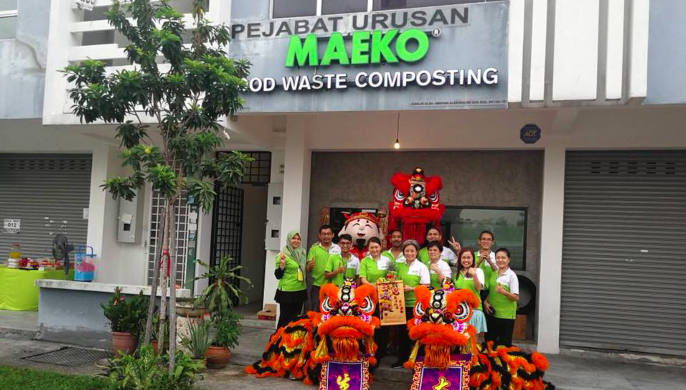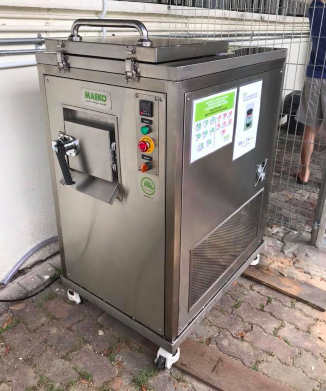
The MAEKO team
Is there a direct link between food wastage and climate change?
Food wastage is undoubtedly a perennial problem, globally. It is cruel to waste food. Because when we waste food, we are not only wasting food but also all the resources that went into growing it, including water. As we know, large quantities of wasted food items end up in landfills and become a significant source of methane — a potent greenhouse gas. Greenhouse gas emission is one of the most significant contributors to climate change.
Malaysia, like many other countries in Asia, also faces food wastage problem. And there has not been a sophisticated mechanism to address this menace effectively.
“Food wastage has been a rising pollution issue in Malaysia, but no one has taken it seriously yet,” Chelsea Chee tells e27. “Many people find lucrative business opportunities in the recycling of other types of waste, but organic waste has been left untouched due to its messiness and high handling cost. We are here to fill this gap.”
Also Read: 6 ways you can overcome fear of failure in your corporate life
Chee’s startup MAEKO, which she started along with her partners Mae Ooi and Darren Chee, converts food waste into bio-organic compost for agriculture. It aims to help Malaysia achieve zero food waste by providing composting solutions to all kinds of businesses and homes. Its goal is to help ‘close the loop’ of sustainability, allowing food waste that comes from the farms to go back to the farms as fertiliser for future food.
“Very few people attempt saving the mother earth, and even less succeeds in doing so. We overcame strong opposition from different quarters in our quest to create awareness for responsible food waste management. With this in mind, we three teamed up to start MAEKO,” adds Chea, who comes with 20 years of experience in business management, development and creative management.
How it works
MAEKO has developed an ‘all-in-one’ commercial on-site composting machine, which can decompose all types of food waste in an aerobic environment using controlled parameters, such as temperatures, agitation and airflow. The MAEKO composter is embedded with a specially-designed crusher unit to decompose the waste in 24 hours.
The machine also features sophisticated ventilation and a bio-enzyme filtration system to eliminate unpleasant smells.
“You can decompose all types of food waste (raw or cooked), including fruit, vegetables, grains, dairy, meat, fish, poultry, eggshells and crustacean shells,” she explains the working process.
At present, the startup caters only to commercial and industrial users — such as hotels, supermarkets, F&B outlets, factories, municipalities, educational institutions, and hospitals. It also plans to work with residential communities for a central composting as well as a personal composter.
The commercial machine units can process 30 litres to 5 tons per day. Customers can either purchase the machine or rent it from MAEKO.
Tackling the issue at the source
MAEKO practises city solutions where food waste is managed and tackled at source. The machines are installed on-site, which eliminates the need for transporting food waste to a centralised, reducing haulage costs. This also results in reduced greenhouse gas by about 66 per cent, compared to disposing of the waste at landfills, Chee claims.

Once the process is over, the compost is packed. MAEKO will sell this directly to farmers (some compost will be given away to the farming community free of cost as part of its campaign to promote urban farming).
“We believe in a circular economy-driven environment, wherein all the food wastes are recycled and used in farming to produce food to be placed on our plate. This closes the entire loop,” she continues.
This space is challenging, admits Chee. The greatest challenge is creating awareness that food waste is a resource and should be recycled and put to good use.
“We participate in a lot of events and create many awareness programmes to reach out to more people to achieve a successful habitual shift among the public. As there is still no legislation in Malaysia to responsibly manage food waste, many food waste producers are still unwilling to do composting compare to discarding the waste to landfill,” she reveals.
A bootstrapped venture thus far, Chee and her partners have plans to start raising funding at the beginning of 2020 to scale and expand the business.
The company recently bagged the second spot in the regional Seedstars competition in Kuala Lumpur.
The post MAEKO addresses climate change by converting food waste into compost. Greta Thunberg should feel happy appeared first on e27.